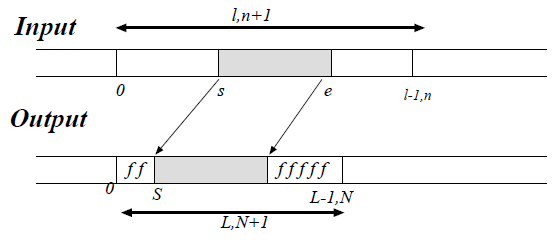bcp
Functions
-
int main(int argc, char *argv[])
bcp [ option ] [ infile ]
-s int
start number (input) \((0 \le s \le e)\)
-e int
end number (input) \((s \le e < l)\)
-l int
block length (input) \((1 \le l)\)
-m int
block order (input) \((0 \le n)\)
-S int
start number (output) \((0 \le S < L)\)
-L int
block length (output) \((1 \le L)\)
-M int
block order (output) \((0 \le N)\)
-f double
pad value \((f)\)
+type char
data type
cchar (1byte)Cunsigned char (1byte)sshort (2byte)Sunsigned short (2byte)hint (3byte)Hunsigned int (3byte)iint (4byte)Iunsigned int (4byte)llong (8byte)Lunsigned long (8byte)ffloat (4byte)ddouble (8byte)elong double (16byte)aascii
infile str
input data sequence
stdout
copied data sequence
This command copies data blocks in a frame-by-frame manner. The below figure shows the overview of the command.

The following example extracts multiples of three from a ramp sequence.
ramp -s 1 -l 9 | bcp +d -s 2 -l 3 | x2x +da # 3, 6, 9 ramp -s 1 -l 9 | bcp +d -s 2 -l 3 -L 2 | x2x +da # 3, 0, 6, 0, 9, 0 ramp -s 1 -l 9 | bcp +d -s 2 -l 3 -L 2 -S 1 | x2x +da # 0, 3, 0, 6, 0, 9
- Parameters:
argc – [in] Number of arguments.
argv – [in] Argument vector.
- Returns:
0 on success, 1 on failure.